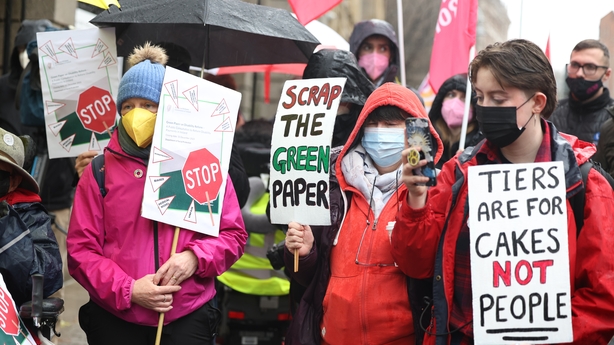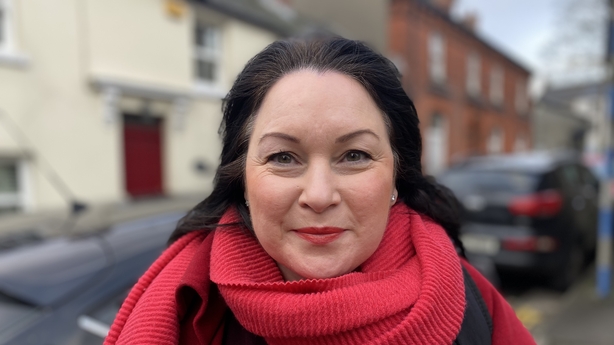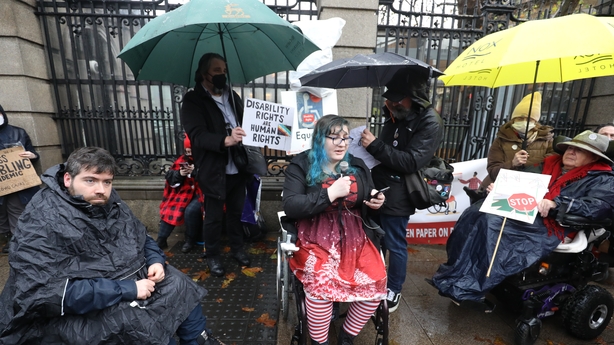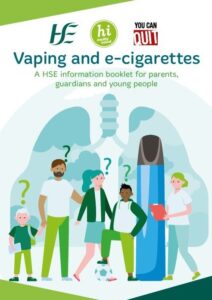|
GE02020
Meeting 5th February 2020 The Glen
Have your say
|
| Dear Colleague,
Thank you for helping to share information and updates from HSE services. |
|||||||
| Keeping well during the festive period
The HSE is reminding people to plan for any health needs over the Christmas period ahead. See below for tips and information to keep well:
Visit hse.ie/winter for advice on how to protect yourself and your family during winter, managing common illnesses and when to get help. RSV circulating at extraordinarily high levels and flu increasing week on week RSV and flu infections are circulating at very high levels. People are urged to help limit the spread by cocooning very young babies, practicing respiratory etiquette (covering coughs), and making sure all vaccines are up to date, including flu and COVID-19. Symptoms of an RSV infection start like a cold and can include:
These symptoms usually appear in stages and not all at once. After 4 to 5 days, babies and young children can develop bronchiolitis. Their symptoms may get worse and include:
These symptoms often remain for 3 to 4 days before slowly getting better. It can usually take 10 to 14 days before babies and young children recover from an RSV infection. Many babies and children may have a cough that lasts for weeks after the start of the infection. This does not need antibiotics. Flu symptoms can also start with a cough or a cold and include:
If your child has other symptoms of the flu, keep them at home for at least 5 days after their symptoms begin. Survey to review the Implementation of the HSE Second National Intercultural Health Strategy (2018-2023) A Review of the Implementation of the HSE Second National Intercultural Health Strategy (2018-2023) is being undertaken by Dr. Matt Cannon and Dr. Frank Houghton on behalf of the HSE. As part of this review, we are very interested in hearing from both individuals and representatives of diverse groups about intercultural aspects of Ireland’s health services. Please note that all information collected is confidential and that any information collected will be anonymised BEFORE the final report is presented to the HSE. Please pass this survey on to community members/ clients/ service users. The survey will remain open until 31 December 2023. To take the survey in English please click here. Kliknij tutaj, aby wypełnić ankietę w języku polskim. Pour répondre au sondage en français, cliquez ici. Si aad u qaadatid sahanka Af-Soomaaliga halkan guji. لإجراء الاستطلاع باللغة Recruitment campaign for Children’s Disability Network Teams Do you know someone who could join our team of highly skilled professionals, working with the young people and families who use our services? Starting in January 2024, we are recruiting both newly qualified and experienced Dietitians, Occupational Therapists, Physiotherapists, Psychologists, Social Workers, and Speech and Language Therapists, to join our Children’s Disability Network Teams. Each child who uses our services is unique and our teams work together with them and their families to empower and support them to set and achieve goals that make a difference. Apply at www.hse.ie/cdnt Pregnancy, baby and toddler health on mychild.ie With about 60,000 new babies born a year, you’ll find expert advice as you prepare for and get to know your baby. The information grows with you and your little one – from pregnancy and birth, to taking care of newborns and toddlers. Developed with parents, the site has almost 500 pages of advice on pregnancy, baby and toddler health with millions of visits each year. Find expert advice for every step at mychild.ie Christmas ‘elf and safety’ tips for families from the HSE’s mychild.ie With Christmas on the way, the HSE’s mychild.ie is sharing advice for parents, caregivers, and other family members to make the most of the festive break with children. These ‘elf and safety’ tips include being aware of seasonal hazards like button batteries and how to reduce the risk of infections getting in the way of the festivities. Sexual Wellbeing resources Over the festive period, the Sexual Wellbeing campaign, developed by the HSE Sexual Health and Crisis Pregnancy Programme (SHCPP), will continue to promote condom use and free home STI testing alongside a range of sexual health messages on digital and social platforms. Free home STI tests are available to order throughout the festive period on Sexualwellbeing.ie The latest preliminary data from HPSC, continues to show an increase nationally in notifications of chlamydia (+25%) and gonorrhoea (+68%) when compared to the same time last year. More information is available on the HPSC website. Condom use and testing help to reduce the spread of STIs, and are key prevention messages. You will find information about the Sexual Wellbeing campaigns resources and social media assets in the attached Sexual Wellbeing Partner Pack. HSE Talking Health and Wellbeing Podcast: A look back on 2023 In this week’s podcast, our podcast hosts look back and reflect on their experiences and the success of the series to date. They discuss standout episodes, including Nikki Killeen’s discussion about the Safer Nightlife Programme, Prof. Bobby Smyth’s insights on addiction in young people, and Dr. Sheila Gilheaney’s episode about the work of Alcohol Action Ireland to advance implementation of Alcohol Act and hidden alcohol marketing. They also highlight the power of personal stories in their episodes, the importance of context and humanity in healthcare discussions, and the value of including healthcare staff voices. Hosts, Fergal Fox, Noreen Turley and Eamon Keogh express gratitude to their guests and listeners and look forward to future conversations. Listen and share wherever you get your Podcasts or on the HSE Health and Wellbeing YouTube channel. COVID-19 For information and advice, please go to https://www2.hse.ie/conditions/covid19/ and https://www.hpsc.ie/a-z/respiratory/coronavirus/novelcoronavirus/. Clinical and professional guidance relating to COVID-19 is available on www.hpsc.ie. Health service information for Ukrainian nationals
If your organisation has any requests in relation to public health information materials, please reply directly to this email to let us know. We wish you seasons greetings and good health. Kahlil and Katie |
|||||||
Contact Information
|
|||||||
Downloads
|
Christmas & New Year 2023
Dear Colleague
As you all know a pay award of 8 % has been accepted that applies to all Section 39 agencies (health & disability services) including Cork CIL as well as to other state funded community organisations Section 56 agencies (services to children) and Section 10 agencies (homeless and addiction services). This pay award does not give us pay parity, but it is a positive step as we go into 2024.
The pay award is as follows:
Unfortunately, Cork CIL cannot apply the pay award until we receive the funding for it. We all hoped that this would be made available before the end of the year, but we have been informed that for Section 39 Agencies it will be into 2024 before it is received by the organisations.
As soon as we have the funding available, we will be paying out to staff through payroll. We will keep you informed.
In recognition of all your hard work and commitment throughout 2023 Cork CIL will be giving each employee small gift to celebrate the New Year. It will be included in your first pay of 2024. It is small and does not reflect the value that we place on all our staff who are the best there are.
Wishing you all a safe and Happy Christmas and a healthy New Year
All the very best
Pat Beirne
20th December 2023
|
|
|||||||||||||
|
A protest was held outside Leinster House this afternoon over a Government proposal to reform disability payments.
A Green Paper by the Department of Social Protection has suggested reforming the structure of long-term disability payments by establishing a three-tiered system.
A coalition of disabled people’s organisations have said the paper does not include proposals to remove societal barriers to employment such as improving workplace accessibility or disability equality training for employers.
The Department of Social Protection has pointed out that the Green Paper is about prompting discussion and debate to inform the final design of changes.

However, a suggestion in the paper that a person’s capacity to work will be medically assessed by people employed by the Department has caused dismay and concern among people with disabilities.
One activist has described it as “dehumanising and degrading”.
The Green Paper suggests a new model of long-term disability payments where the level of payment made to a person with a disability is calculated based on the nature and impact of their disability.
People with a capacity to work would be supported and incentivised through the Intreo public employment service to pursue and take up employment opportunities.
However, some disabled people and charity representatives have said their experience with Intreo has not been positive in the past.
Protesters said an estimated 84% of the disabled community will be required to engage with Intreo for training and employment.
The tiered system proposed by the Department aims to respond to findings of a study which was commissioned by the Government on the cost of disability in 2020.
The report by Indecon produced an estimated range of costs relating to the degree of a person’s disability.
They started at €11,579 and went up to €16,284, or between €9,282 and €14,513 using an econometric/equivalent standard of living approach.
‘Battle on a daily basis’

Clodagh Roche should be the ‘poster child’ of what is being proposed in the Green Paper, but despite working all her life, she is now homeless.
Ms Roche has had a hearing impairment since she was a child and acquired a visual impairment after getting measles at the age of four, but her parents kept her in mainstream school.
Nothing was going to stop her or make her different from her friends, so she worked from the age of 14 to buy her first hearing aids, which were extremely expensive at the time.
As she scrimped and saved and paid huge amounts for hearing aids over the years, Clodagh’s friends started reaching milestones.
It was at this point, she realised she was falling behind, and would never earn enough to buy her first car or get on the property ladder.
In recent years, she damaged her back which means she now has to use physical aids as she waits on a HSE operating list.
Acquiring a physical disability half way through her life has been very challenging.
While she has not worked since she injured her back, when Clodagh was in employment, the discrimination was blatant.

“I worked, but some of the jobs didn’t really kind of turn out as well as I’d hoped. I was told that in one job – we’re going to have to let you go because we need somebody here that can actually hear people.”
In the absence of employment, Ms Roche returned to university where she faced more battles.
“I really had to battle on a daily basis to have my voice heard and to try to work with other people and say this isn’t working for me. Lifts were constantly broken, lecturers wouldn’t give me notes.”
The response to her request for printed lecture notes was that the university did not do them on ecological/environmental grounds.
Despite working and making an effort to further her education, Ms Roche is now in homeless accommodation in Drogheda. She has been on the list for disabled housing with Meath County Council for 17 years.
“I’ve worked all my life. I’ve battled the system. And what the Government is proposing is that within two years, they will have a system set up and running whereby they are placing people with disabilities into a tiered system.
“If that’s not discriminatory, I really don’t know what to say about it, except that they’re taking the wrong approach and what they’re doing is they’re going to further push people into poverty, like myself”.
In a statement, the Department of Social Protection pointed out that the minister recently extended the timeframe for public consultation on the Green Paper by three months to March 2024.
It said it is trying to address “the twin challenges” of insulating people who cannot work from experiencing poverty; and promoting and supporting a higher rate of employment for disabled people.
It stressed that it was not a cost-cutting measure and that changes proposed, if introduced, would cost an additional €130 million each year.
“Nobody will lose their entitlement to a disability payment arising from the Green Paper proposals, nor will they see that payment level reduced. In addition, engagement with public employment services will be on a voluntary basis,” it said.
It said the Department “is committed to enhancing supports for people with disabilities”, and it highlighted a range of measures taken in the recent Budget, including the €400 Disability Support Grant, the extension of the Free Travel Pass, increased funding for the Wage Subsidy Scheme for People with Disabilities and an increase to all weekly payments. from January.
(This is an Article for RTE.ie. Here is the direct link to the article Disability payment reform will create ‘tiered system’ (rte.ie))
|
|||||||||||||
|
Step into the spirit of the season with our Playback theatre performance, “The Gift of Giving.” As the holiday season approaches, we invite you to reflect on the joy, warmth, and sometimes the complexity that comes with the act of giving and receiving.
Explore the spectrum of emotions associated with gift-giving—Have you experienced the thrill of finding the perfect present, or perhaps the disappointment beneath the shiny wrapping paper? Share your thoughts on the joy of giving, the challenges of navigating consumerism, and the nuanced emotions tied to this time of year.
In this unique interactive experience, our audience becomes the storyteller. Through the art of Playback theatre, your personal stories will come to life as a team of actors and musicians interpret and perform them on the spot. It’s a collaborative and spontaneous journey where every voice is heard, and community unfolds.
After the performances, we invite you to join us for a cozy gathering with mulled apple cider and mince pies.
All proceeds from the performance will be donated to Doctors Without Borders—a charitable organization committed to providing medical aid where it’s needed most. They are currently on the ground in Gaza where their medical aid is crucial.
Come and be a part of an evening filled with stories, laughter, and the magic of shared experiences.
Crawford College of Art and Design, T12 XK25
Our Vaping/E-cigarettes: Get the Facts webinar was live streamed last week. In case you missed it or wish to watch it back, you can access it here.

During our webinar, we discussed vaping and the emerging risks to the health of children and young people. The number of people who vape has increased significantly in Ireland in recent years. Data focused on 16 year olds, found 1-in-5 were using E-cigarettes in 2019 which is double what it was in 2015. More up-to-date Irish data is due to be published early next year. Based on these recent trends, we expect this will confirm a further increase in E-cigarette use among children and young people in Ireland. Adults’ usage has increased from just 3% in 2016 to 8% in 2023. This is concerning as the longer-term health effects of vaping are uncertain at this time. During this webinar we heard from experts about this important and emerging issue.
Topics covered included:
• Trends in smoking and vaping among adults, children and young people
• A HRB assessment of the Benefits and Risks of harm caused by vaping
• Regulating to better protect people from the harms of vaping
• Support for parents, guardians and teachers to protect children and young people from the harms of vaping
We will continue to work with parents and guardians, schools, the Department of Education, Department of Health and all stakeholders to ensure we protect children and young people from the harms of smoking and E-cigarettes. We were delighted to be able to launch two new resources on November 22nd. The first is a plain English Information booklet on E- Cigarettes/vaping and the second is an Information and guidance on E-Cigarettes and Vaping for Schools to support schools in dealing with this emerging issue.
As promised, please find links to information and resource below:
Information booklet on E- Cigarettes/vaping
Information and guidance on E-Cigarettes and Vaping for Schools
E-cigarette Resources
HSE joint response to concerns of children and young people using e-cigarettes
Vaping information for parents
Healthy Choice 2, Nicotine Addiction; Tobacco and E-Cigarettes
Quit4Youth Resources
Stop Smoking Services
We had a very positive reaction from our audience on the day, and were really pleased with the interest and engagement during the event.
Thank you for your support, and if you require any further information please email the Tobacco Free Ireland Programme at tfi@hse.ie
We’re happy to share with you some valuable insights from our latest HSE Talking Health and Wellbeing Podcast episode, where we delved into the world of vaccines, specifically focusing on COVID-19 and flu vaccines. Here are some of our key points from the episode:
The Importance of Vaccination: Our guests Dr. Sarah Geoghegan, Clinical Lead of the National Immunisation Advisory Committee, and Gillian Buggy, Regional Flu Lead for Southeast Community Health Care, emphasised the importance of vaccinations, especially for healthcare workers and vulnerable groups. Although vaccines may not be as effective in certain high-risk groups, it’s crucial for those caring for them to be vaccinated.
The Power of Vaccines: Dr. Geoghegan shed light on how vaccines work as she tells us that they mimic infection, triggering an immune response in our bodies. Some prevent infection altogether, while others prevent severe consequences.
Hybrid Immunity: We explored the concept of hybrid immunity, which refers to having both natural infection and vaccination for COVID-19. Studies show that this provides the best form of protection against the virus.
Flu Vaccination: Every year, a significant number of people die from the flu. Healthcare workers can unknowingly carry and spread the flu, making vaccination crucial.
Vaccine Uptake: We discussed the need to increase the uptake of vaccines, especially among healthcare workers, children, and vulnerable and older people. We also touched on the possibility of combining the COVID and flu vaccines in the future using messenger RNA vaccine technology.
Promoting Vaccination: Gillian shared some of the efforts being made across the country to promote vaccine uptake, including an online course called, “Flu and COVID-19 Vaccines for Healthcare Workers”. Gillian highly recommends this 15-minute course for all healthcare staff, available on HSELand.
Thanks to our guests and Cairin Conway for working on this one. I hope these insights spark your curiosity and encourage you to listen to our podcast. Remember, your questions are always welcome to healthandwellbeing.communications@hse.ie and don’t forget to share the podcast with others who may be interested.